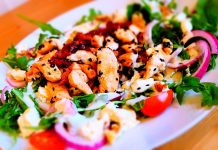
I recently read a book called Fit For Life (Diamond) which contained some controversial material and ideas. I have a couple of questions concerning some of Diamond’s proposals.
- Diamond says there are 3 natural cycles in the body. From 4 A.M. to noon the body is eliminating waste and one is not to eat anything but fresh fruit in small doses. From noon to 8 P.M. it is time to eat balanced and properly combined meals. After 8 P.M. (until 4 A.M.) the body is assimilating food nutrients so no eating is recommended. Is any of what he says supported by any other research? This would seem to contradict the idea that a “balanced” breakfast is the most important meal of the day. In fact, Diamond directly states that breakfast, other than a banana or orange, is not only unnecessary, it is harmful to the bodily cycles.
- Diamond also puts forth the idea that one cannot mix certain “concentrated foods” (foods other than most vegetables and fresh fruits) in the same 3 hour period. For example, one can not eat a steak with a potato since a cooked potato is a concentrated starch and the steak is a concentrated protein. He states that the body cannot secrete the acids and alkalis required to break both down without spoiling one or the other and causing both to ferment and putrefy in the digestive tract. Is this true or does our body manage to digest both effectively and nutritionally?
- He hates milk. He says that adult humans have no ability to break milk down effectively and that it does little in the body but gum up the works. Is this supported by any independent research?
Please let me know if Diamond has been debunked and if you would supply me with references to other opinions. Thank you for your time and trouble.
Well, your instincts are correct. There is no research to support any diet assumptions above. At this time I did not find any research references that “debunk” Diamond’s opinions due to the fact that there is no research on his diet. Therefore I would conclude this diet is definitely not recommended.
I find it quite interesting when these theories on food or digestion arise. Remember this body has evolved with the same genetic material for thousands of years. Basically, cave people ate when they found food and didn’t eat when food wasn’t available. Any available food source was eaten when cave people found food. The cave people who didn’t eat died and did not pass on their genes. Thin cave people didn’t survive periods of famine and didn’t pass on their skinny genes. Parent cafe people showed by example to their children what foods were safe to eat by eating it themselves. Don’t you find it amazing that the human race has survived so long eating a mix of food from food that is available?
The human body runs a biochemical factory 24 hours a day and does not cycle elimination, consumption, and absorption. The GI (gastrointestinal) tract is a constant conveyor belt. All happen simultaneously and even continuously. Food starts at the mouth is digested in the stomach and small intestines, absorbed towards the end of the small intestine and waste is eliminated via the large intestine where water is resorbed back into the body in order to eliminate formed stool. Yes, some foods produce gas (broccoli, Brussel sprouts, cabbage, Cauliflower), which is passed out of the anus or burping through the mouth due to swallowed air or carbonated beverages. No food putrefies the body and the intestinal peristalsis (rhythmic movement of food and stool by intestinal muscles) keeps food moving from the stomach to anus.
Breakfast is the best meal of the day. It breaks the fast your body has been in since the last meal the previous day. BTW you are more likely to wake up hungry if you don’t snack at night when you may not have a lot of exercise opportunities to burn these calories before sleep.
Milk is one of the 2 most perfect foods along with eggs. It is a food source of protein, calcium, phosphorus, vitamin D and riboflavin, vitamin B2. The human body needs a food source of these nutrients as bone calcium turns over in the body and is replaced over time. When blood calcium goes down and there is insufficient calcium from food, your body will draw calcium from bone as calcium is one of the blood electrolytes (charged particles) that keeps your body running. Also, adequate calcium is good for your heart. Other food sources of calcium like leafy green vegetables have oxalates which reduce the absorption of calcium. If there are no food sources of calcium, the bone becomes weak and can break more easily. Some persons do develop intolerance to milk, which is caused by a decreased production of lactase the enzyme that reduces milk sugar (lactose) and there is a wide range of how sensitive to lactose people are. Babies can develop a milk allergy to the protein in cow’s milk which may only last a few years or may last a lifetime.
I would suggest that if you are looking for a reputable nutrition reference, look for one written by a Registered Dietitian who has both the education and expertise to provide sound nutrition information.



